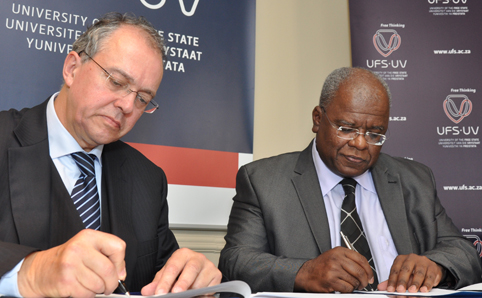 |
|
Proff. Lex Boutler (left) from the Vrije University of Amsterdam and Jonathan Jansen are signing an institutional Memorandum of Understanding. Prof. Boutler was part of a delegation that visited the campus two weeks ago.
|
A delegation from the Vrije University of Amsterdam (VUA) visited the UFS two weeks ago to discuss and sign an institutional Memorandum of Understanding (MOU) between the VUA and UFS.
The MOU follows after academics have collaborated on a number of research projects between the Faculties of Theology and the International Institute for Studies in Race, Reconciliation and Social Justice to create a firm foundation for the two universities to strengthen their collaborative efforts towards achieving academic excellence.
Another initiative that was discussed was the possibility of a joint PhD project and mobility scholarship through the South Africa-VU Amsterdam Strategic Alliances (SAVUSA) and Stimulating Knowledge Innovation through Life-long Learning (SKILL) programme earmarked for UFS and VUA staff and Master’s and PhD graduate students.
The VUA delegation also had an opportunity to meet and engage with the UFS F1 students. These students will visit the VUA in January 2012, where they will also visit the Amsterdam University College (AUC).
The AUC is an international liberal arts and sciences programme that attracts students from all over the world to engage through intensive seminars on a variety of subjects.